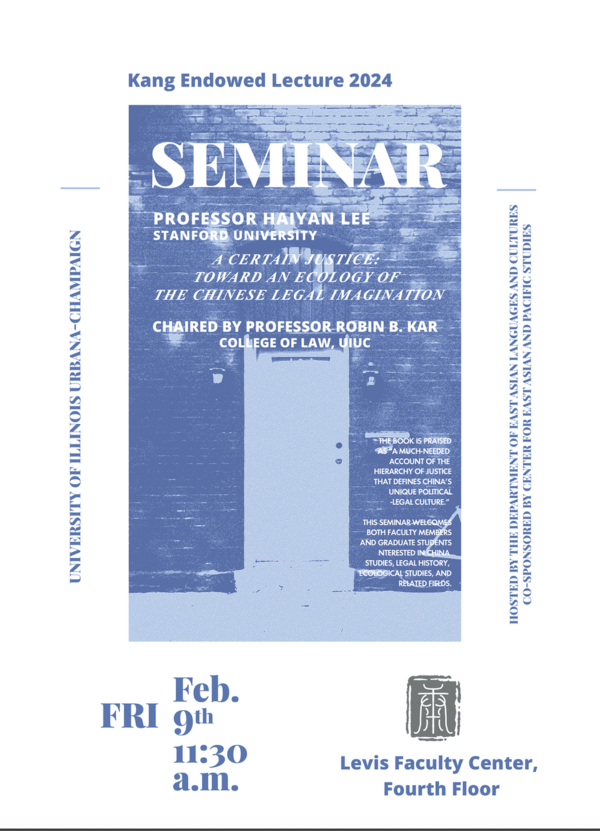
2024 EALC Kang Endowed Lecture: Haiyan Lee "A Certain Justice: Toward an Ecology of the Chinese Legal Imagination"
- Event Type
- Seminar/Symposium
- Sponsor
- Hosted by the Department of East Asian Languages and Cultures; Co-sponsored by Center for East Asian and Pacific Studies
- Location
- Levis Faculty Center, Fourth Floor
- Date
- Feb 9, 2024 11:30 am
- Speaker
- Haiyan Lee (Stanford University)
- Contact
- Jingling Chen
- jingling@illinois.edu
- Views
- 249
- Originating Calendar
- CEAPS Events Calendar
The Department of East Asian Languages and Cultures is delighted to announce the upcoming Kang Endowed Lecture featuring Professor Haiyan Lee at Stanford University on February 9, 2024 (Friday). As part of this annual event, a lunch seminar will commence at 11:30, led by Professor Lee, focusing on her recent book, A Certain Justice: Toward an Ecology of the Chinese Legal Imagination, published by Chicago University Press. The book has been praised as "a much-needed account of the hierarchy of justice that defines China’s unique political-legal culture.”
About the Book:
To many outsiders, China has an image as a realm of Oriental despotism where law is at best window dressing and at worst an instrument of coercion and tyranny. In this highly original contribution to the interdisciplinary field of law and humanities, Haiyan Lee contends that this image arises from a skewed understanding of China’s political-legal culture, particularly the failure to distinguish what she calls high justice and low justice.
In the Chinese legal imagination, Lee shows, justice is a vertical concept, with low justice between individuals firmly subordinated to the high justice of the state. China’s political-legal culture is marked by a mistrust of law’s powers, and as a result, it privileges substantive over procedural justice. Calling on a wide array of narratives—stories of crime and punishment, subterfuge and exposé, guilt and redemption—A Certain Justice helps us recognize the fight for justice outside the familiar arenas of liberal democracy and the rule of law.
About Haiyan Lee
Haiyan Lee is Walter A. Haas Professor of the Humanities and Professor of East Asian Languages and Cultures and of Comparative Literature at Stanford University. Before joining Stanford in 2009, she taught at the University of Colorado at Boulder and the University of Hong Kong, and held post-doctoral fellowships at Cornell University and Harvard University. Her first book, “Revolution of the Heart: A Genealogy of Love in China, 1900-1950,” is a critical genealogy of the idea of “love” (qing) in modern Chinese literary and cultural history. It is the first recipient of the Joseph Levenson Prize in the field of modern Chinese literature. Her second book, “The Stranger and the Chinese Moral Imagination,” examines how the figure of “the stranger”—foreigner, migrant, class enemy, woman, animal, ghost—in Chinese fiction, film, television, and exhibition culture tests the moral limits of a society known for the primacy of consanguinity and familiarity. Her new book, “A Certain Justice: Toward an Ecology of the Chinese Legal Imagination” investigates Chinese visions of “justice” at the intersection of narrative, law, and ethics.